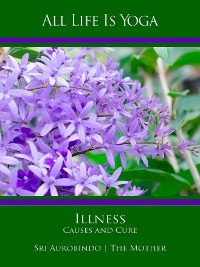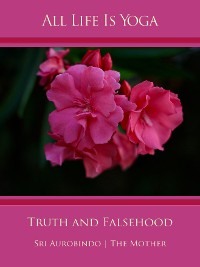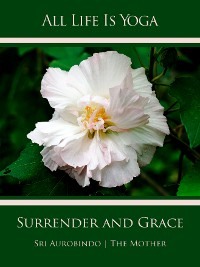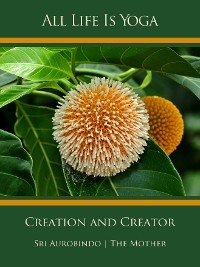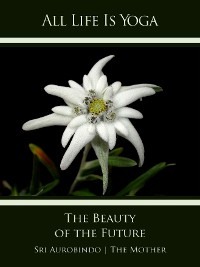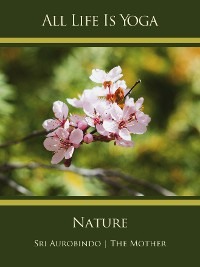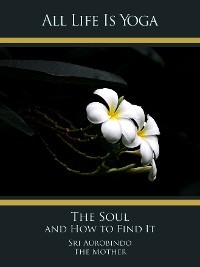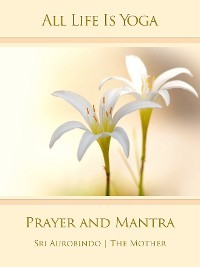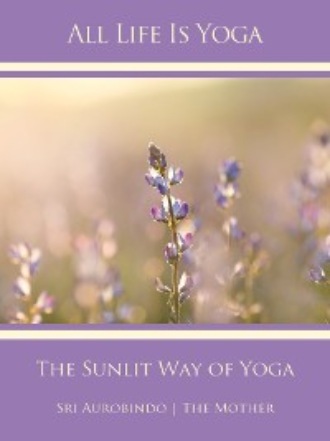
Полная версия
All Life Is Yoga: The Sunlit Way of Yoga

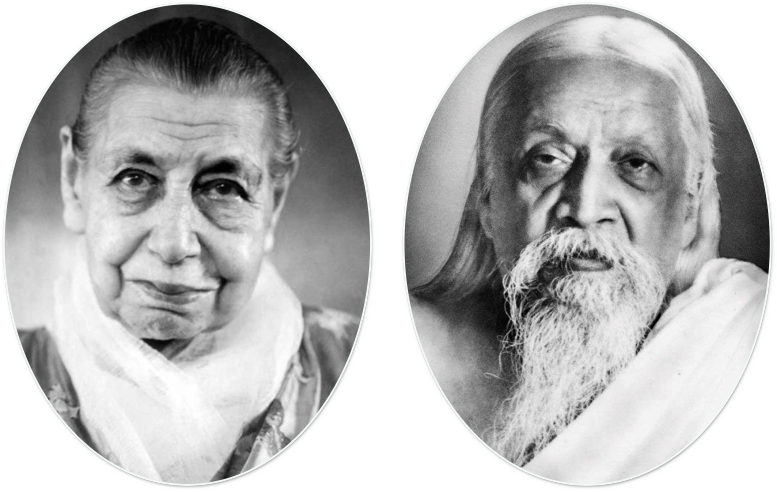
Omsriaurobindomira
All
Life
Is
Yoga
“All life is Yoga.” – Sri Aurobindo
The Sunlit Way of Yoga
Sri Aurobindo | The Mother

SRI AUROBINDO BHAVAN
BERCHTESGADENER LAND

Copyright 2020
AURO MEDIA
Verlag und Fachbuchhandel
Wilfried Schuh
Germany
www.sriaurobindo.center
www.auro.media
ALL LIFE IS YOGA
The Sunlit Way of Yoga Selections from the Works of Sri Aurobindo and The Mother First edition 2020 ISBN 978-3-96387-065-1
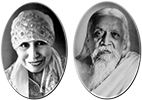
© Photos and selections of the works of
Sri Aurobindo and the Mother:
Sri Aurobindo Ashram Trust
Puducherry, India

Flower on the cover:
Prunus dulcis. White to pink. Spiritual significance and explanation given by the Mother: Smile of Nature Nature rejoices in her beauty.
Publisher’s Note
This is one in a series of some e-books created by SRI AUROBINDO DIGITAL EDITION and published by AURO MEDIA under the title All Life Is Yoga. Our effort is to bring together, from Sri Aurobindo and the Mother, simple passages with a practical orientation on specific subjects, so that everyone may feel free to choose a book according to his inner need. The topics cover the whole field of human activity, because true spirituality is not the rejection of life but the art of perfecting life.
While the passages from Sri Aurobindo are in the original English, most of the passages from the Mother (selections from her talks and writings) are translations from the original French. We must also bear in mind that the excerpts have been taken out of their original context and that a compilation, in its very nature, is likely to have a personal and subjective approach. A sincere attempt, however, has been made to be faithful to the vision of Sri Aurobindo and the Mother. These excerpts are by no means exhaustive.
Bringing out a compilation from the writings of Sri Aurobindo and the Mother, which have a profound depth and wideness unique, is a difficult task. The compiler’s subjective tilt and preferences generally result in highlighting some aspects of the issues concerned while the rest is by no means less significant. Also without contexts of the excerpts the passages reproduced may not fully convey the idea – or may be misunderstood or may reduce a comprehensive truth into what could appear like a fixed principle.
The reader may keep in mind this inherent limitation of compilations; compilations are however helpful in providing an introduction to the subject in a handy format. They also give the readers a direct and practical feel of some of the profound issues and sometimes a mantric appeal, musing on which can change one’s entire attitude to them.
The excerpts from the writings of Sri Aurobindo and the Mother carry titles and captions chosen by the editor, highlighting the theme of the excerpts and, whenever possible, borrowing a phrase from the text itself. The sources of the excerpts are given at the end of each issue.
We hope these compilations will inspire the readers to go to the complete works of Sri Aurobindo and the Mother and will help them to mould their lives and their environments towards an ever greater perfection.
“True spirituality is not to renounce life, but to make life perfect with a Divine Perfection.” – The Mother
* * *
ContentsTitle PageCopyrightPublisher’s NoteI. SOME REMARKS OF THE PATHFINDERSQuotations1. The Hour of God2. The Law of the Way3. This is Thy Work and the Aim of Thy Being4. The Burden of Humanity5. Preparation of the Sunlit Path6. Conditions to Follow the Sunlit Path7. The Path of Integral Yoga – A Spiritual Adventure8. The Path9. The Sunlit Path to Divine GraceII. MAKE OF THY DAILY WAY A PILGRIMAGEQuotation1. The Call2. The Value of Education3. Morality, Religion, Yoga4. Surrender, Self-Offering, Humility5. Sincerity, Vigilance, Will-Power6. Other Persons and Forces7. Courage, Endurance, Effort8. Receptivity and Aspiration9. Concentration, Meditation, Work10. The Divine Work11. Peace and Quiet12. The Spirit and the Psychic Being13. The Ego and Self-Giving14. Faith and the Grace15. Controlling One’s Thoughts16. Developing the Mind and Senses17. Mundane Affairs18. Words, Opinions, Judgments19. Virtue, Purity, Freedom20. Effort, Patience, Progress21. The Divine, the World and ManIII. THE ODYSSEY OF THE PSYCHIC BEINGQuotation1. Introduction2. The Breadths and Depths of Our Psychic Complex3. The Awakening4. The Influence of the Psychic Presence5. After-Life and Rebirth6. Natal Home of the Psychic Being in the World-Soul7. The Two Dimensions of Psychic Growth8. The Adventure of Ignorance9. Odyssey of the Psychic Being on the Ocean of Inconscient10. Central Conflict of the Psychic Being11. The Divine Mother and the Psychic Being12. The Psychic Being Calls the Divine Mother to Manifest in MatterAPPENDIXReferencesGuideCoverTable of ContentsStart Reading
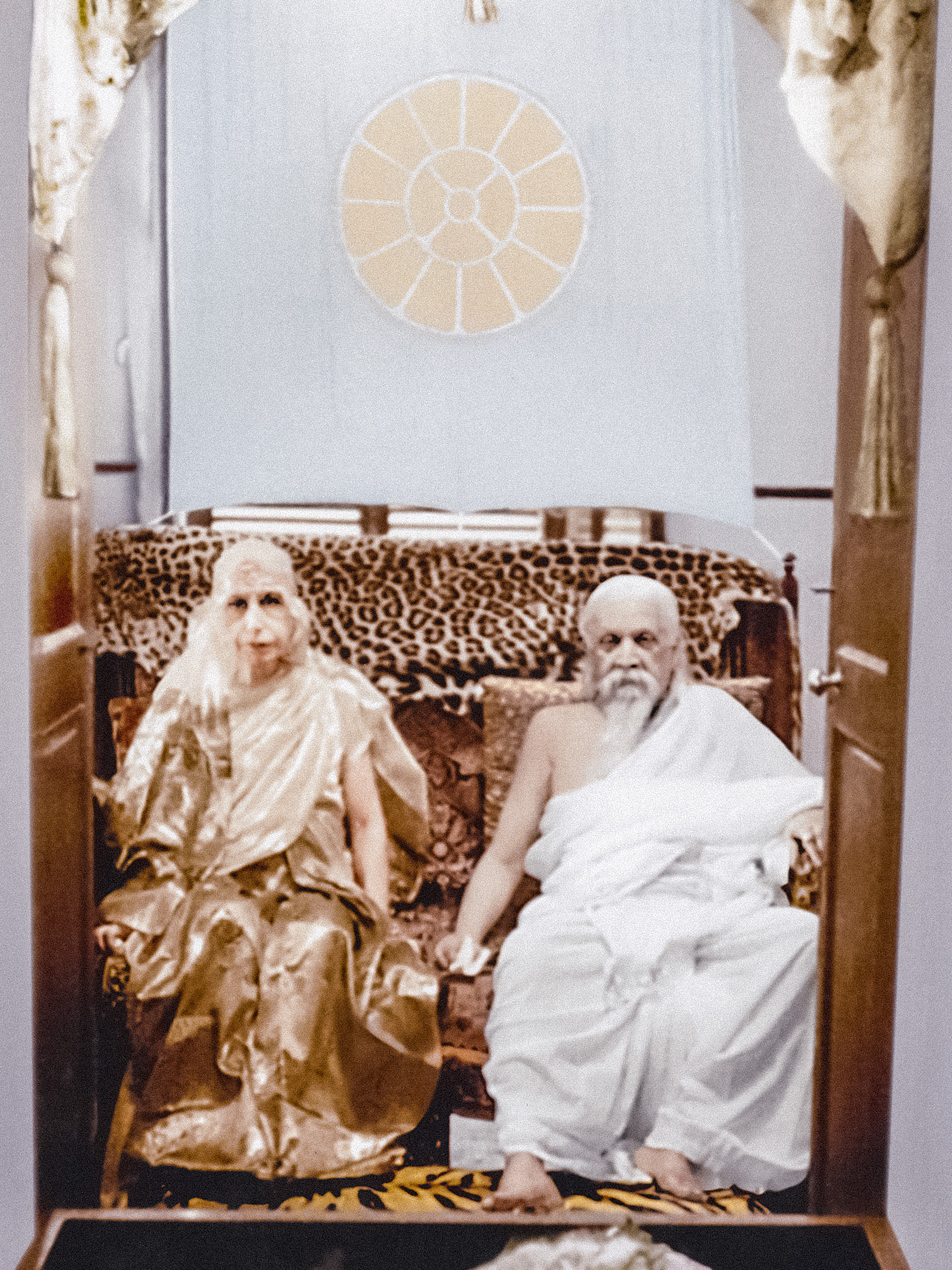
The spiritual consciousness and spiritual life are exceedingly difficult to attain; it needs a deep and strong call and the turning of all the energies towards the one object to arrive at any kind of full success (siddhi). Even those who have cut off all other ties, find it difficult not to live in a double consciousness, one inward and turned towards the spiritual change and the other which is still chained to the ordinary movements and pulls them down from their spiritual experience into the persistent and unchanged course of the lower nature. If you have not the entire and undivided call, it is better not to take the plunge, unless you are prepared for very bitter inner struggles, great difficulties and relapses and a hampered and doubtful progress. It is better in that case to prepare yourself by meditation and concentration while still living in the family and the usual human life, until the spiritual attraction is strong enough to overshadow and destroy all others.
Next, you speak of leading a higher life in order to fit yourself for service to others. But leading a higher life is a vague mental phrase and the object of Yoga is not service to others. The object of Yoga is to enter into an entirely new consciousness in which you live no longer in the mind and the ego but in the divine consciousness and grow into the true inmost truth of your being above mind and life and body. The aim in most ways of Yoga is to draw back altogether from life into this greater existence. In Sri Aurobindo’s Yoga, the aim is to transform mind, life and body into an expression of this divine Truth and to make the outward as well as the inward life embody it – a much more difficult endeavour. To act out of this greater consciousness becomes the only rule of life, abandoning all other dharmas. Not to serve either one’s own ego or others, but to serve the Divine Shakti and be the instrument of her works is the law of this life. – Sri Aurobindo
* * *
I had a clear vision of the two kinds of opposites in nature (not only in nature but in life) which almost everyone carries within himself: one is the possibility of realization, the other is the path chosen to attain it. There is always (it’s probably inevitable) the stormy path of struggle, and then there is the sunlit path. After much study and observation, I have had a sort of “spiritual ambition” (if it can be called that) to bring to the world a sunlit path, to eliminate the necessity for struggle and suffering: something that aspires to replace this present phase of universal evolution with a less painful phase. – The Mother
* * *
Chapter 1
The Hour of God
Words of Sri Aurobindo
There are moments when the Spirit moves among men and the breath of the Lord is abroad upon the waters of our being; there are others when it retires and men are left to act in the strength or the weakness of their own egoism. The first are periods when even a little effort produces great results and changes destiny; the second are spaces of time when much labour goes to the making of a little result. It is true that the latter may prepare the former, may be the little smoke of sacrifice going up to heaven which calls down the rain of God’s bounty. Unhappy is the man or the nation which, when the divine moment arrives, is found sleeping or unprepared to use it, because the lamp has not been kept trimmed for the welcome and the ears are sealed to the call. But thrice woe to them who are strong and ready, yet waste the force or misuse the moment; for them is irreparable loss or a great destruction.
In the hour of God cleanse thy soul of all self-deceit and hypocrisy and vain self-flattering that thou mayst look straight into thy spirit and hear that which summons it. All insincerity of nature, once thy defence against the eye of the Master and the light of the ideal, becomes now a gap in thy armour and invites the blow. Even if thou conquer for the moment, it is the worse for thee, for the blow shall come afterwards and cast thee down in the midst of thy triumph. But being pure cast aside all fear; for the hour is often terrible, a fire and a whirlwind and a tempest, a treading of the winepress of the wrath of God; but he who can stand up in it on the truth of his purpose is he who shall stand; even though he fall, he shall rise again, even though he seem to pass on the wings of the wind, he shall return. Nor let worldly prudence whisper too closely in thy ear; for it is the hour of the unexpected, the incalculable, the immeasurable. Mete not the power of the Breath by thy petty instruments, but trust and go forward.
But most keep thy soul clear, even if for a while, of the clamour of the ego. Then shall a fire march before thee in the night and the storm be thy helper and thy flag shall wave on the highest height of the greatness that was to be conquered.
* * *
Chapter 2
The Law of the Way
Words of Sri Aurobindo
First be sure of the call and of thy soul’s answer. For if the call is not true, not the touch of God’s powers or the voice of his messengers, but the lure of thy ego, the end of thy endeavour will be a poor spiritual fiasco or else a deep disaster.
And if not the soul’s fervour, but only the mind’s assent or interest replies to the divine summons or only the lower life’s desire clutches at some side attraction of the fruits of Yoga-power or Yoga-pleasure or only a transient emotion leaps like an unsteady flame moved by the intensity of the Voice or its sweetness or grandeur, then too there can be little surety for thee in the difficult path of Yoga.
The outer instruments of mortal man have no force to carry him through the severe ardours of this spiritual journey and Titanic inner battle or to meet its terrible or obstinate ordeals or nerve him to face and overcome its subtle and formidable dangers. Only his spirit’s august and steadfast will and the quenchless fire of his soul’s invincible ardour are sufficient for this difficult transformation and this high improbable endeavour.
Imagine not the way is easy; the way is long, arduous, dangerous, difficult. At every step is an ambush, at every turn a pitfall. A thousand seen or unseen enemies will start up against thee, terrible in subtlety against thy ignorance, formidable in power against thy weakness. And when with pain thou hast destroyed them, other thousands will surge up to take their place. Hell will vomit its hordes to oppose thee and enring and wound and menace; Heaven will meet thee with its pitiless tests and its cold luminous denials. Thou shalt find thyself alone in thy anguish, the demons furious in thy path, the Gods unwilling above thee. Ancient and powerful, cruel, unvanquished and close and innumerable are the dark and dreadful Powers that profit by the reign of Night and Ignorance and would have no change and are hostile. Aloof, slow to arrive, far-off and few and brief in their visits are the Bright Ones who are willing or permitted to succour. Each step forward is a battle. There are precipitous descents, there are unending ascensions and ever higher peaks upon peaks to conquer. Each plateau climbed is but a stage on the way and reveals endless heights beyond it. Each victory thou thinkest the last triumphant struggle proves to be but the prelude to a hundred fierce and perilous battles... But thou sayest God’s hand will be with me and the Divine Mother near with her gracious smile of succour? And thou knowest not then that God’s grace is more difficult to have or to keep than the nectar of the Immortals or Kuvera’s priceless treasures? Ask of His chosen and they will tell thee how often the Eternal has covered his face from them, how often he has withdrawn from them behind his mysterious veil and they have found themselves alone in the grip of Hell, solitary in the horror of the darkness, naked and defenceless in the anguish of the battle. And if his presence is felt behind the veil, yet is it like the winter sun behind clouds and saves not from the rain and snow and the calamitous storm and the harsh wind and the bitter cold and the grey of a sorrowful atmosphere and the dun weary dullness. Doubtless the help is there even when it seems to be withdrawn, but still is there the appearance of total night with no sun to come and no star of hope to pierce the blackness. Beautiful is the face of the Divine Mother, but she too can be hard and terrible. Nay, then, is immortality a plaything to be given lightly to a child or the divine life a prize without effort or the crown for a weakling? Strive rightly and thou shalt have; trust and thy trust shall in the end be justified; but the dread Law of the Way is there and none can abrogate it.
* * *
Chapter 3
This is Thy Work and the Aim of Thy Being
Words of Sri Aurobindo
This is thy work and the aim of thy being and that for which thou art here, to become the divine superman and a perfect vessel of the Godhead. All else that thou hast to do, is only a making thyself ready or a joy by the way or a fall from thy purpose. But the goal is this and the purpose is this and not in power of the way and the joy by the way but in the joy of the goal is the greatness and the delight of thy being. The joy of the way is because that which is drawing thee is also with thee on thy path and the power to climb was given thee that thou mightrest mount to thy own summits.
If thou hast a duty, this is thy duty; if thou ask what shall be thy aim, let this be thy aim; if thou demand pleasure, there is no greater joy, for all other joy is broken or limited, the joy of a dream or the joy of a sleep or the joy of self-forgetting. But this is the joy of thy whole being. For if thou say what is my being, this is thy being, the Divine, and all else is only its broken or its perverse appearance. If thou seek the Truth, this is the Truth. Place it before thee and in all things be faithful to it.
It has been well said by one who saw but through a veil and mistook the veil for the face, that thy aim is to become thyself; and he said well again that the nature of man is to transcend himself. This is indeed his nature and that is indeed the divine aim of his self-transcending.
What then is the self that thou hast to transcend and what is the self that thou hast to become? For it is here that thou shouldst make no error; for this error, not to know thyself, is the fountain of all thy grief and the cause of all thy stumbling.
That which thou hast to transcend is the self that thou appearest to be, and that is man as thou knowest him, the apparent Purusha. And what is this man? He is a mental being enslaved to life and matter; and where he is not enslaved to life and matter, he is the slave of his mind. But this is a great and heavy servitude; for to be the slave of mind is to be the slave of the false, the limited and the apparent. The self that thou hast to become, is the self that thou art within behind the veil of mind and life and matter. It is to be the spiritual, the divine, the superman, the real Purusha. For that which is above the mental being, is the superman. It is to be the master of thy mind, thy life and thy body; it is to be a king over Nature of whom thou art now the tool, lifted above her who now has thee under her feet. It is to be free and not a slave, to be one and not divided, to be immortal and not obscured by death, to be full of light and not darkened, to be full of bliss and not the sport of grief and suffering, to be uplifted into power and not cast down into weakness. It is to live in the Infinite and possess the finite. It is to live in God and be one with him in his being. To become thyself is to be this and all that flows from it.
Be free in thyself, and therefore free in thy mind, free in thy life and thy body. For the Spirit is freedom.
Be one with God and all beings; live in thyself and not in thy little ego. For the Spirit is unity.
Be thyself, immortal, and put not thy faith in death; for death is not of thyself, but of thy body. For the Spirit is immortality.
To be immortal is to be infinite in being and consciousness and bliss; for the Spirit is infinite and that which is finite lives only by his infinity.
These things thou art, therefore thou canst become all this; but if thou wert not these things, then thou couldst never become them. What is within thee, that alone can be revealed in thy being. Thou appearest indeed to be other than this, but wherefore shouldst thou enslave thyself to appearances?
Rather arise, transcend thyself, become thyself. Thou art man and the whole nature of man is to become more than himself. He was the man-animal, he has become more than the animal man. He is the thinker, the craftsman, the seeker after beauty. He shall be more than the thinker, he shall be the seer of knowledge; he shall be more than the craftsman, he shall be the creator and master of his creation; he shall be more than the seeker of beauty, for he shall enjoy all beauty and all delight. Physical, he seeks for his immortal substance; vital he seeks after immortal life and the infinite power of his being; mental and partial in knowledge, he seeks after the whole light and the utter vision.
To possess these is to become the superman; for it is to rise out of mind into the supermind. Call it the divine mind or Knowledge or the supermind; it is the power and light of the divine will and the divine consciousness. By the supermind the Spirit saw and created himself in the worlds, by that he lives in them and governs them. By that he is Swarat Samrat, self-ruler and all-ruler.
Supermind is superman; therefore to rise beyond mind is the condition.
To be the superman is to live the divine life, to be a god; for the gods are the powers of God. Be a power of God in humanity.
To live in the divine Being and let the consciousness and bliss, the will and knowledge of the Spirit possess thee and play with thee and through thee, this is the meaning.
This is the transfiguration of thyself on the mountain. It is to discover God in thyself and reveal him to thyself in all things. Live in his being, shine with his light, act with his power, rejoice with his bliss. Be that Fire and that Sun and that Ocean. Be that joy and that greatness and that beauty.
When thou hast done this even in part, thou hast attained to the first steps of supermanhood.
* * *
Chapter 4
The Burden of Humanity
Words of Sri Aurobindo
I have said that the Avatar is one who comes to open the Way for humanity to a higher consciousness – if nobody can follow the Way, then either our conception of the thing, which is also that of Christ and Krishna and Buddha, is all wrong or the whole life and action of the Avatar is quite futile. X seems to say that there is no way and no possibility of following, that the struggles and sufferings of the Avatar are unreal and all humbug, – there is no possibility of struggle for one who represents the Divine. Such a conception makes nonsense of the whole idea of Avatarhood – there is then no reason in it, no necessity for it, no meaning in it. The Divine being all-powerful can lift people up without bothering to come down on earth. It is only if it is part of the world-arrangement that he should take upon himself the burden of humanity and open the Way that Avatarhood has any meaning.
*
Words of Sri Aurobindo
Mother spoke to me of the right attitude as one without tension and strain, one which is full of sunshine and as spontaneous as a flower opening to the light. This is all very well for beings like you and the Mother, who are Avatars, but how can we poor mortals take this vague prescription for guidance? And how to get this attitude if not through constant prayer, arduous meditation and a constant effort to reject wrong movements?
You say that this way is too difficult for you or the likes of you and it is only “avatars” like myself or the Mother that can do it. That is a strange misconception, for it is on the contrary the easiest and simplest and most direct way and anyone can do it, if he makes his mind and vital quiet, even those who have a tenth of your capacity can do it. It is the other way of tension and strain and hard endeavour that is difficult and needs a great force of Tapasya. As for the Mother and myself, we have had to try all ways, follow all methods, to surmount mountains of difficulties, a far heavier burden to bear than you or anybody else in this Asram or outside, far more difficult conditions, battles to fight, wounds to endure, ways to cleave through impenetrable morass and desert and forest, hostile masses to conquer, a work such as I am certain none else had to do before us. For the Leader of the Way in a work like ours has not only to bring down and represent and embody the Divine, but to represent too the ascending element in humanity and to bear the burden of humanity to the full and experience not in a mere play or lila but in grim earnest all the obstruction, difficulty, opposition, baffled and hampered and only slowly victorious labour which are possible on the Path. But it is not necessary nor tolerable that all that should be repeated over again to the full in the experience of others. It is because we have the complete experience that we can show a straighter and easier road to others – if they will only consent to take it. It is because of our experience won at a tremendous price that we can urge upon you and others, “Take the psychic attitude; follow the straight sunlit path, with the Divine openly or secretly upbearing you – if secretly, he will yet show himself in good time, – do not insist on the hard, hampered, roundabout and difficult journey.”
* * *
Chapter 5
Preparation of the Sunlit Path
Words of Sri Aurobindo
Peace was the very first thing that the Yogins and seekers of old asked for and it was a quiet and silent mind – and that always brings peace – that they declared to be the best condition for realising the Divine. A cheerful and sunlit heart is the fit vessel for the Ananda and who shall say that Ananda or what prepares it is an obstacle to the Divine union? As for despondency, it is surely a terrible burden to carry on the way. One has to pass through it sometimes, like Christian of The Pilgrim’s Progress through the Slough of Despond, but its constant reiteration cannot be anything but an obstacle. The Gita specially says, “Practise the Yoga with an undespondent heart”, anirvinnacetasa.


